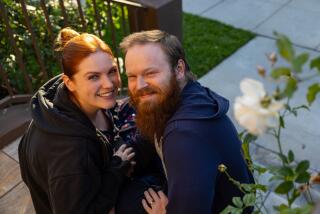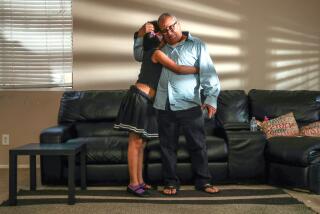Hands Full : At Home, Healthy, Happy Quads Mean a Changing Life for Parents
- Share via
After five months, Rubina Dereghishian is worn out. Adjusting to life with quadruplets has not been easy for the frail 28-year-old mother.
“Two hands are not enough to cope with four babies,” Rubina said, even though they are healthy, happy infants.
Rubina and husband Norair managed--barely--for three months after the babies came home, making do with the help of two nurses from Huntington Memorial Hospital, where the quads--the first in the hospital’s 92-year history--were born Jan. 15.
The nurses volunteered their time to the new mother for a few hours each day.
Norair, 34, took two weeks off from his job as a management trainee for Arco’s mini-markets when the quads came home, but until recently, Rubina has had to go it alone most of the time. Her husband works six days a week and has little time to devote to the day-to-day care of the quads.
Parents Arrived to Help
“Because I am out all the time, my wife is the one who has to care for the babies,” he said.
Relief finally came last month when Rubina’s parents arrived in the United States from Iran for a six-month visit.
Now, four and sometimes eight hands can come to the rescue when all the babies need attention at the same time.
“It helps to have her parents here--without them we couldn’t manage--but the babies sleep well and behave well so there are not a lot of problems with them,” Norair said.
“At the beginning we had no experience, but first-time parents, even if there is only one baby, have no experience,” he said. “We are getting used to it and the babies are more mature now so the problems are reduced a lot.”
A Cry and Quick Attention
For a houseful of children, the Dereghishian home seems unusually quiet. Rubina and her mother, Anna Mokhtarian, 57, split the workload, each tending to two of the children. A crying baby quickly gets attention.
“One reason the babies are happy and don’t fuss much is because there are two of us to talk to them and calm them if they are upset,” Rubina said.
The women share the diaper duty, changing 30 to 40 disposables a day, and take turns getting up in the middle of the night. The babies, still on a liquid diet, are fed in shifts--two sleep while the other two are bottle-fed. “It takes all our time to take care of the babies,” Rubina said.
They weighed less than four pounds at birth but now range from 11 to 13, Rubina said.
‘I Was Blessed’
“I feel fortunate my babies were born so healthy. I was blessed. They’re healthy babies, so what else can I ask?”
The girls, Armineh, Melineh and Nairy, and the boy, Narbeh, are still eating formula donated by well-wishers when they were born.
Rubina spent the last three months of pregnancy in the hospital to prevent early labor, and as a result of her confinement the quads were only six weeks premature. All were home within a month.
The parents are immigrants from the Armenian section of Iran. They met as students in England, were married five years ago and have lived in the United States for three years.
Rubina was taking fertility drugs when she conceived but “I thought the most children I would have was twins. I was scared of two and I ended up with four. I would rather have had one at a time, but now I have my four and wouldn’t change it for anything in the world.”
Sympathy for Frustacis
Rubina said she was not aware of the risks of premature births and became impatient during her long stay in the hospital.
But the birth of the Frustaci septuplets, four of whom have died, has had a strong impact on her, and she knows now that the long wait was worthwhile.
“It is very tragic those babies died,” she said. “Those babies were smaller than mine and their mother wasn’t pregnant as long as I was. That is one sad story. It is hard to go through the pregnancy and lose the babies.”
Although the Dereghishian babies are healthy, it is costly to provide four times the usual amount of baby paraphernalia, ranging from diapers to talcum powder to cribs. And Norair’s take-home pay is only about $1,000 a month.
The Dereghishians’ insurance paid for most of the $142,753 hospital bill and the Huntington absorbed the rest, a spokesman said.
‘We Are Managing’
And, although he knows expenses will mount as the children grow, Norair has a positive outlook: “It is a worry, but finances are a worry for every parent. We are managing.”
The Dereghishians, who lived in an apartment in Glendale when the quads were born, moved into their modest three-bedroom house near Altadena in March after the owner, an Armenian, responded to pleas for housing aid and agreed to rent it at less than the going rate.
A fund established by the hospital helped equip the Dereghishians with clothes, furniture, food and strollers to get started. But the babies soon will outgrow their car seats.
Since the babies came home, there have been no donations, Rubina said. “When they were born it was a hot story,” she said, “but now people are not interested.”
Neither parent wants to think about what will happen when Rubina’s parents return to Iran.
“I’m trying to convince them to stay,” Rubina said. “I’m not in a condition to lose them.”
More to Read
Sign up for Essential California
The most important California stories and recommendations in your inbox every morning.
You may occasionally receive promotional content from the Los Angeles Times.










